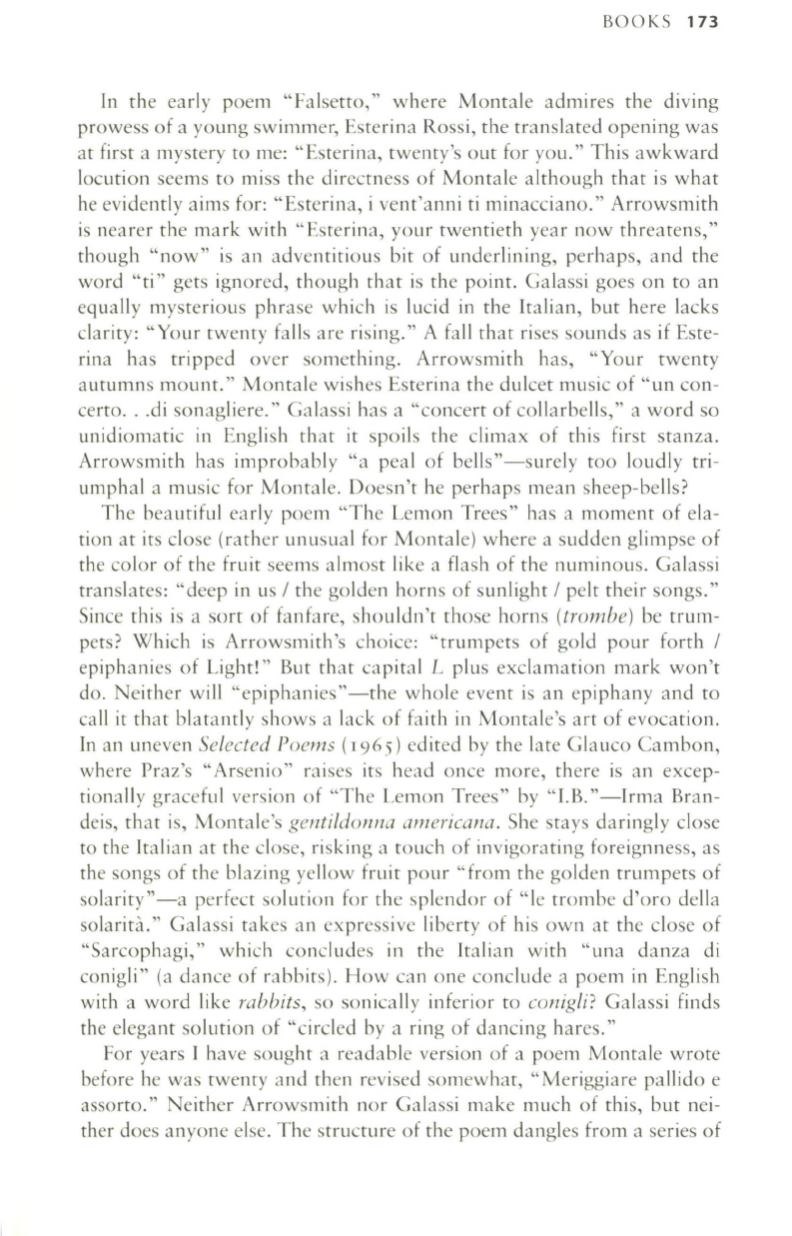
BOOKS
173
In the early poem "falsetto," where Montale admires the diving
prowess of a young swimmer, Esterina Rossi, the translated opening was
at first a mystery to me: "Esterina, twenty's out for you." This awkward
locution seems to miss the directness of Montale although that is what
he evidently aims for: "Esterina, i vent'anni ti minacciano." Arrowsmith
is nearer the mark with "Esterina, your twentieth year now threatens,"
though "now" is an adventitious bit of underlining, perhaps, and the
word "ti" gets ignored, though that is the point. Galassi goes on to an
equally mysterious phrase which is lucid in the Italian, but here lacks
clarity: "Your twenty falls are rising." A fall that rises sounds as if Este–
rina has tripped over something. Arrowsmith has, "Your twenty
autumns mount." Montale wishes Esterina the dulcet music of "un con–
certo...di sonagliere." Galassi has a "concert of collarbells," a word so
unidiomatic in English that it spoils the climax of this first stanza.
Arrowsmith has improbably "a peal of bells"-surely too loudly tri–
umphal a music for Montale. Doesn't he perhaps mean sheep-bells?
The beautiful early poem "The Lemon Trees" has a moment of ela–
tion at its close (rather unusual for Montale) where a sudden glimpse of
the color of the fruit seems almost like a flash of the numinous. Galassi
translates: "deep in us / the golden horns of sunlight / pelt their songs."
Since this is a sort of fanfare, shouldn't those horns
(tromhe)
be trum–
pets? Which is Arrowsmith's choice: "trumpets of gold pour forth /
epiphanies of Light!" But that capital
L
plus exclamation mark won't
do. Neither will "epiphanies"-the whole event is an epiphany and to
call it that blatantly shows a lack of faith in Montale's art of evocation.
In an uneven
Selected Poems
(1965)
edited by the late Glauco Cambon,
where Praz's "Arsenio" raises its head once more, there is an excep–
tionally graceful version of "The Lemon Trees" by "I.B."-Irma Bran–
deis, that is, Montale's
gentildonna americana.
She stays daringly close
to the Italian at the close, risking a touch of invigorating foreignness, as
the songs of the blazing yellow fruit pour "from the golden trumpets of
solarity"-a perfect solution for the splendor of "Ie trombe d'oro della
solarira." Galassi takes an expressive liberty of his own at the close of
"Sarcophagi," which concludes in the Italian with "una danza di
conigli" (a dance of rabbits). How can one conclude a poem in English
with a word like
rabbits,
so sonically inferior to
conigli?
Galassi finds
the elegant solution of "circled by a ring of dancing hares."
For years I have sought a readable version of a poem Montale wrote
before he was twenty and then revised somewhat, "Meriggiare pallido e
assorto." Neither Arrowsmith nor Galassi make much of this, but nei–
ther does anyone else. The structure of the poem dangles from a series of


